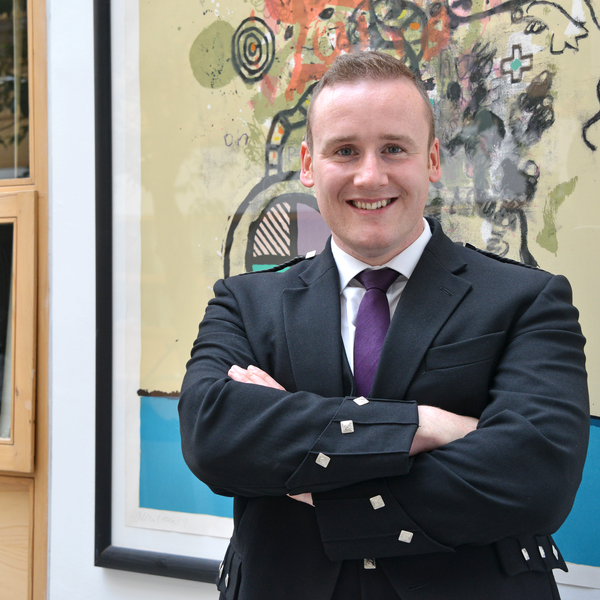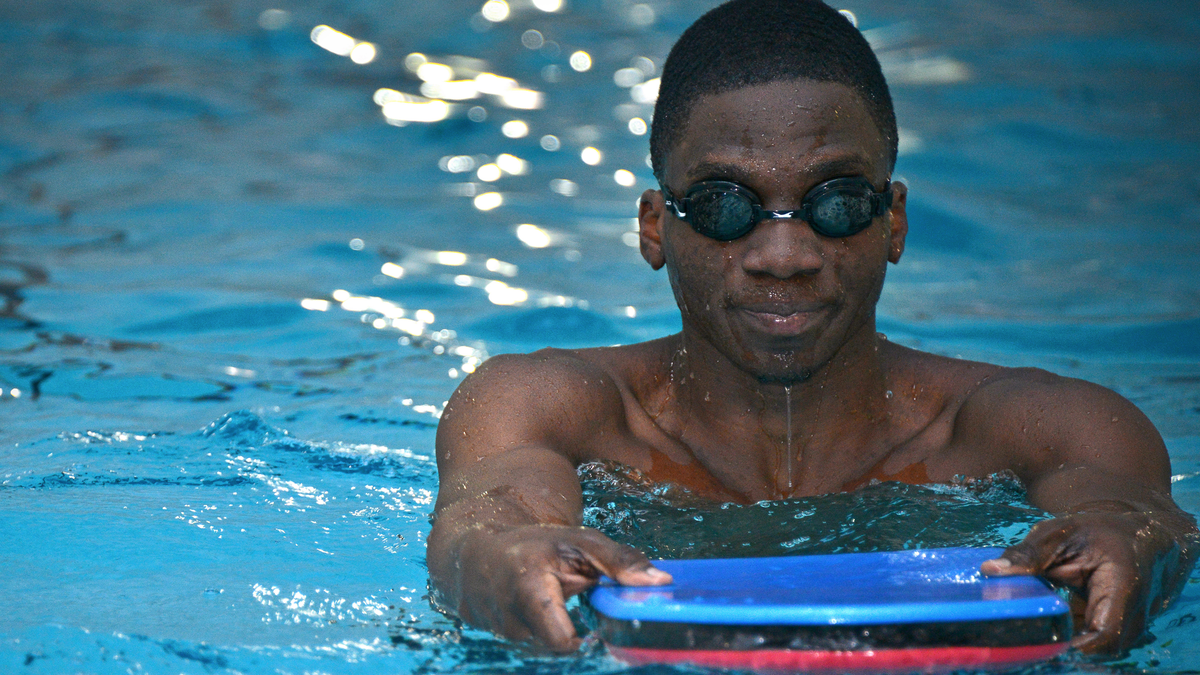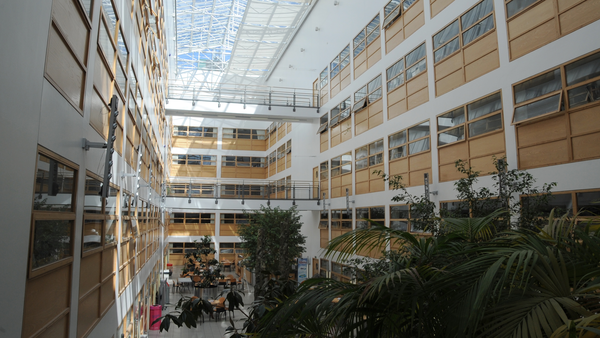Jonathon Smith

Sports & Exercise Science is about understanding how our bodies survive the extreme stresses imposed upon them during sporting activities performed under a wide range of environmental conditions.
We are ranked 1st in the UK for Anatomy and Physiology in The Times & Sunday Times Good University Guide 2024.

Sports and Exercise Science includes the study of the body's responses to exercise and the adaptations that occur in response to regular exercise. Sports and Exercise Science also includes the role that regular modest levels of physical activity can play in maintaining health.
Exercise involves the integrated actions of all the body's systems, and a knowledge of physiology, biochemistry and nutrition is essential to understand how individuals respond to and adapt to the stress of exercise. The exercise and sport sciences are broadly based, and encompass both basic and applied science from the whole body to the molecular level.
5 year MSci degree
This degree offers you the opportunity to undertake a year's placement in an industrial, commercial or research environment and graduate after five years with an MSci (an undergraduate Masters degree) instead of a BSc. Find out more.
A degree in Sports & Exercise Science is taught via a selection of compulsory and optional courses to enhance your learning and prepare you for a future career or further study. In each year you will take courses adding up to 120 credits. Depending on the number of compulsory and optional courses offered by your degree, you can also choose other eligible courses which fit your timetable.
Honours programme may only be taken by full-time study.
Honours candidates are required to take both a two hour general examination (SM4901) and a three hour problem solving examination (SM4902) at the end of the Final Honours Year.
For Honours students the examinations for courses taken in the Final Honours Year will be held at the end of the session.
In year 1 you will take courses in Sport and Exercise Science, Medical Sciences and Chemistry for Life Sciences plus additional courses selected from science and other areas.
15 Credit Points
15 Credit Points
15 Credit Points
This course covers the foundations of chemistry that underpin the life sciences at a molecular level and is suitable for students with different backgrounds including little or no previous study of chemistry. The basic concepts of quantitative chemistry will be covered, along with the different types of organic molecules, acids and bases, and the principles of kinetics and thermodynamics. The relevance of the course materials to life science is emphasised throughout.
Laboratory classes introduce important practical techniques, with experiments that reinforce and complement the taught material.
The course will allow students to continue with other chemistry courses as part of their enhanced study by providing discipline breadth.
15 Credit Points
• Cells are the fundamental unit of life – without them life could not exist, and as such understanding how they function is crucial to our understanding of biology and medical science.• This course provides theoretical knowledge in a diverse range of topics covering the fascinating world of cells, from molecules like DNA, to how different cell types function within our bodies.• All practical classes are research based and will provide theoretical knowledge and skills training in many areas of molecular and cell biology.• Employability skills will also be explored through a highly interactive enterprise session and our online mini course.
15 Credit Points
15 Credit Points
Chemistry plays a vital role in the life sciences, explaining the properties of biomolecules and how biological processes work at a molecular level. Organic reaction mechanisms give insight into how different types of molecules can be synthesised and methods of chemical analysis introduce other important topics linking the chemical and life sciences. The relationship between energy, entropy and equilibrium in driving reactions will be covered and the course concludes with a survey of the molecules of life – proteins, enzymes and sugars.
Laboratory classes complement lectures by consolidating learning and developing problem-solving and hands-on practical skills.
This course, which is prescribed for level 1 undergraduate students (and articulating students who are in their first year at the University), is studied entirely online, takes approximately 5-6 hours to complete and can be taken in one sitting, or spread across a number of weeks.
Topics include orientation overview, equality and diversity, health, safety and cyber security and how to make the most of your time at university in relation to careers and employability.
Successful completion of this course will be recorded on your Enhanced Transcript as ‘Achieved’.
Select a further 30 credit points from courses of choice.
In year 2 further expansion of Sport and Exercise Science courses develop the degree area and cover issues relating to the elite athlete, the recreational exerciser and exercise for health. Courses are also taken in Physiology and Biochemistry.
15 Credit Points
15 Credit Points
15 Credit Points
• understanding the fundamental factors that limit exercise performance is of great importance for human health and athletic performance;
• this course integrates the knowledge in biomechanics, physiology, psychology and pharmacology in order to build a comprehensive understanding of physical activity and exercise performance in humans;
• this core knowledge prepares you for more advanced study of sports and health sciences;
• you will also participate in practical series focussed on energy expenditure and fitness testing which will build essential laboratory and data analysis skills of importance for employability in the area of sports and health
15 Credit Points
The Physiology of Human Organ Systems course aims to develop and integrated understanding of human organ structure and function through:
• innovative teaching approaches covering the digestive, cardiovascular, respiratory, renal and reproductive systems
• participation in practical classes where students act as subjects and investigators. These will reinforce lecture material, develop scientific acumen and build team working skills
• focussed and interactive problem solving sessions applying knowledge to clinical scenarios, and developing fundamental skills critically required in the final years of the degree;
• informal teaching sessions where one-to-one staff-student interactions encourage discussion in a non-threatening environment
15 Credit Points
15 Credit Points
15 Credit Points
Select a further 15 credit points from courses of choice.
In year 3 you will study Integrative Physiology, Clinical Exercise Physiology, Nutrition & Biochemistry of Exercise and also continue your studies in Sports Science.
30 Credit Points
30 Credit Points
30 Credit Points
Select a further 30 credit points from courses of choice.
The Honours year aims to explore in depth, specific aspects of sports science and exercise physiology. An important feature is the ten-week research project, carried out in research laboratories at the University or in local research institutes.
15 Credit Points
30 Credit Points
15 Credit Points
Data Analysis examination paper exclusively for students taking Medical Science degree programmes.
General Essay examination paper exclusively for students taking Medical Science degree programmes.
60 Credit Points
We will endeavour to make all course options available; however, these may be subject to timetabling and other constraints. Please see our InfoHub pages for further information.
You will be taught using a variety of methods and styles and we continually seek to make the teaching engaging, exciting and responsive to the latest research in your subject area. The research we carry out in the School directly informs and guides our teaching, particularly in the final Honours year. Our commitment to teaching is recognised by the range of University of Aberdeen Student-led Teaching Awards given to staff from our School.
As a student, your learning is supported by MyAberdeen, our virtual learning environment from which you can access the lecture Powerpoint slides, online practice tests, links to related reading, and tutorial support material.
We make innovative use of 'educational voting' handsets in class, remote control 'clickers' that allow each and every student to electronically respond in class by anonymous vote to questions posed by the lecturer.
Your academic development is supported from year 1 through to year 4 by an assigned personal tutor, who acts as adviser and mentor throughout your University career.
Students are assessed by any combination of three assessment methods:
The exact mix of these methods differs between subject areas, year of study and individual courses.
Honours projects are typically assessed on the basis of a written dissertation.
The information below is provided as a guide only and does not guarantee entry to the University of Aberdeen.
SQA Highers
Standard: AABB*
Applicants who have achieved AABB (or better), are encouraged to apply and will be considered. Good performance in additional Highers/ Advanced Highers may be required.
Minimum: BBB*
Applicants who have achieved BBB (or are on course to achieve this by the end of S5) are encouraged to apply and will be considered. Good performance in additional Highers/Advanced Highers will normally be required.
Adjusted: BB*
Applicants who have achieved BB, and who meet one of the widening access criteria are are guaranteed a conditional offer. Good performance in additional Highers/Advanced Highers will be required.
* Including good performance in at least two Mathematics/ Science subjects by the end of your senior phase of education.
More information on our definition of Standard, Minimum and Adjusted entry qualifications.
A LEVELS
Standard: BBB*
Minimum: BBC*
Adjusted: CCC*
* Including good performance in at least two Mathematics/ Science subjects by the end of your senior phase of education.
More information on our definition of Standard, Minimum and Adjusted entry qualifications.
International Baccalaureate
32 points, including 5, 5, 5 at HL, with two Mathematics/ Science subjects at HL.
Irish Leaving Certificate
5H with 3 at H2 AND 2 at H3 including a minimum of H3 from two Science or Mathematics subjects.
Entry from College
Advanced entry to this degree may be possible from some HNC/HND qualifications, please see www.abdn.ac.uk/study/articulation for more details.
SQA Highers
Standard: BBBB*
Applicants who have achieved BBBB (or better), are encouraged to apply and will be considered. Good performance in additional Highers/ Advanced Highers may be required.
Minimum: BBB*
Applicants who have achieved BBB (or are on course to achieve this by the end of S5) are encouraged to apply and will be considered. Good performance in additional Highers/Advanced Highers will normally be required.
Adjusted: BB*
Applicants who have achieved BB, and who meet one of the widening access criteria are are guaranteed a conditional offer. Good performance in additional Highers/Advanced Highers will be required.
Foundation Apprenticeship: One FA is equivalent to a Higher at A. It cannot replace any required subjects.
* Including good performance in at least two Mathematics/ Science subjects by the end of your senior phase of education.
More information on our definition of Standard, Minimum and Adjusted entry qualifications.
A LEVELS
Standard: BBC*
Minimum: BCC*
Adjusted: CCC*
* Including good performance in at least two Mathematics/ Science subjects by the end of your senior phase of education.
More information on our definition of Standard, Minimum and Adjusted entry qualifications.
International Baccalaureate
32 points, including 5, 5, 5 at HL, with two Mathematics/ Science subjects at HL.
Irish Leaving Certificate
5H with 3 at H2 AND 2 at H3 including a minimum of H3 from two Science or Mathematics subjects.
Entry from College
Advanced entry to this degree may be possible from some HNC/HND qualifications, please see www.abdn.ac.uk/study/articulation for more details.
The information displayed in this section shows a shortened summary of our entry requirements. For more information, or for full entry requirements for Sciences degrees, see our detailed entry requirements section.
To study for an Undergraduate degree at the University of Aberdeen it is essential that you can speak, understand, read, and write English fluently. The minimum requirements for this degree are as follows:
IELTS Academic:
OVERALL - 6.0 with: Listening - 5.5; Reading - 5.5; Speaking - 5.5; Writing - 6.0
TOEFL iBT:
OVERALL - 78 with: Listening - 17; Reading - 18; Speaking - 20; Writing - 21
PTE Academic:
OVERALL - 59 with: Listening - 59; Reading - 59; Speaking - 59; Writing - 59
Cambridge English B2 First, C1 Advanced or C2 Proficiency:
OVERALL - 169 with: Listening - 162; Reading - 162; Speaking - 162; Writing - 169
Read more about specific English Language requirements here.
The University of Aberdeen International Study Centre offers preparation programmes for international students who do not meet the direct entry requirements for undergraduate study. Discover your foundation pathway here.
You will be classified as one of the fee categories below.
| Fee category | Cost |
|---|---|
| RUK | £9,250 |
| Tuition Fees for 2024/25 Academic Year | |
| EU / International students | £24,800 |
| Tuition Fees for 2024/25 Academic Year | |
| Home Students | £1,820 |
| Tuition Fees for 2024/25 Academic Year |
Students from England, Wales and Northern Ireland, who pay tuition fees may be eligible for specific scholarships allowing them to receive additional funding. These are designed to provide assistance to help students support themselves during their time at Aberdeen.
Further Information about tuition fees and the cost of living in Aberdeen
View all funding options in our Funding Database.
Sports and Exercise Science is a discipline that offers an opportunity to combine an interest in the biological sciences with a career in a field related to sport, physical activity or health.
Graduates find employment in many areas of Biomedical and human-based sciences subjects allied to medicine and also in the sport and leisure sectors where their understanding of the basis of human performance adds to their other skills. Many students will continue in research posts where the intensive project work in the Honours year provides particularly valuable experience. Others will go on to a more vocational medical related MSc, in for example, Physiotherapy or Dietetics; or a postgraduate qualification in teaching PE or Biology.
Our degree programmes are built to enhance your employability and three flagship options give our degrees a distinctively different flavour from many others. All our degrees offer:
You will be taught by a range of experts including professors, lecturers, teaching fellows and postgraduate tutors. Staff changes will occur from time to time; please see our InfoHub pages for further information.

Focused on developing future effective therapies, the Institute of Medical Sciences houses nearly 400 researchers and support staff working on cutting-edge biomedical subjects aimed at understanding the human body's response to infection and disease.

A dedicated Medical Library on the Foresterhill Health Campus and the fantastic facilities in the Sir Duncan Rice Library at King’s College, are complemented by online access to the key medical and health sciences journals and textbooks.

Our state-of-the-art Science Teaching Hub provides students with a digitally focussed environment including advanced analytical tools, research-grade equipment and flexible laboratory spaces.
Find out moreDiscover Uni draws together comparable information in areas students have identified as important in making decisions about what and where to study. You can compare these and other data for different degree programmes in which you are interested.